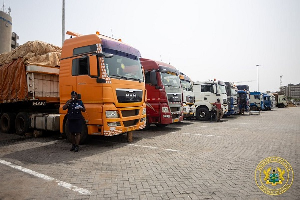Today, the 8th of March 2011, marks 100 years of women¹s struggle in the world for equal rights, equal status and emancipation.
After years of struggle for women¹s emancipation, in 1911 a day was set aside to celebrate women. It was not until 1975 that the women of the world Ghana included finally got the United Nations to accept to deliberate on issues concerning women: their rights, responsibilities and their development. It was in 1975 that almost all countries started the awareness of women¹s rights being human rights. The United Nations hence, set aside this day of March 8th to celebrate, deliberate and analyse on the status of women.
As we mark another year of international women¹s day, we women of Ghana and indeed of the world, are galvanising our actions to continue the battle we have been waging since 1909. A battle that is ongoing and appears endless; A battle that moved women from a position of nonentity, to a position of some level of equality.
A battle that moved women from lack of education, finance, health, and without any rights as human beings, to a position of enormous strides in the same areas. Progress has been made since the struggle of women¹s rights, emancipation and empowerment began a century ago. Many more women have education up to the tertiary level than ever in the history of women¹s struggle, but it is still not enough since the levels of successes are minimal. Whether women have better economic, social, political or cultural advancement, the levels are so low in relation to the population of women in the world. Because of this, we are still saying that we need more women at the decision making level to make sure that women¹s issues are seen as national issues. It is only when we take control through the decision making process at all levels of governance and development, that we can solve the problem of disparity. It is only when women are part of policy planning and implementation that we will see the requisite improvement in the lives of women.
All studies have shown that without women¹s active involvement in national development programmes from start to finish we will not see any great improvement in our countries¹ growth since there is a direct relationship and link between the empowerment of women and the development of a country, and indeed the world.
52 percent of the world¹s population cannot be seen as irrelevant. 52 percent of the world¹s population cannot be left out of decision-making and yet we say we are practicing democracy.
52 percent of the world cannot be left out of world development programmes and yet we talk of human development programmes?
100 years of struggle: how do we intend to make empowerment possible? Let us rethink, redirect and reanalyse how we can advance the empowerment of women. The 31st December Women¹s Movement since 1982 has been at the forefront of women¹s empowerment. We have played a significant part in changing the face of womanhood in Ghana. I recollect in 1983 in a town in the Eastern Region, when we could not get a single woman to speak out on issues affecting her life because of societal fear and stereotyping. I also remember how women could not open bank accounts without the permission of their fathers or their husbands. Today, we see it as a natural occurrence - and take for granted - when a woman walks into a bank to open an account, but there was a struggle to get to this point in Ghana.
29 years of relentless commitment and hard work has shaped the dreams of millions of women and girls, and translated them into an improved life. The 31st December Women¹s Movement has contributed in developing management capacity among numerous women in Ghana, and some African countries as well. Today, we have encouraged women into political participation, regardless of persuasion, where women are nominated in local government authorities, as chief executives, in parliament and even appointed as ministers and deputy ministers of state. We have mobilised finance to enhance women¹s economic empowerment, and to ensure gender priorities in national plans and budget. 29 years, the 31st December Women¹s Movement has and continues to address the issue of participatory decision making process that includes women. We continue to develop women in their totality i.e economic, political, social and cultural, while promoting gender equality, sensitivity and overall development.
Even with the changing face of womanhood in Ghana, we are still pushing for women to have freedom, justice, equal rights and opportunities. 100 years has not brought about complete equality. Where there is no complete equality, you cannot have equity.
The struggle is not over. Let us today, reflect on the 100 years: our achievements, our difficulties, and our woes.
Let us make things better not only for women and our children but for generations unborn.
Thank you
General News of Tuesday, 8 March 2011
Source: Media Excel












